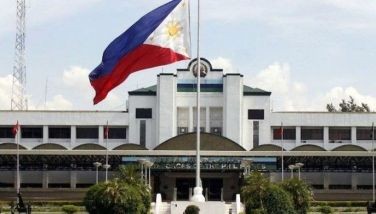Duterte insists on death penalty by hanging
MANILA, Philippines - President-elect Rodrigo Duterte has insisted on executing criminals by hanging, just days after Pope Francis issued a statement opposing the death penalty.
Duterte said while critics of capital punishment view it as “inhuman,” criminals under the influence of drugs have been reduced to a “bestial state.”
“I’m asking for re-imposition of death penalty so that I can hang them,” Duterte said yesterday during the turnover ceremony at the Davao City Police Office.
“They say that death penalty is inhuman. But what is so human about killing an 18-year-old child or raping her? Drugs have reduced human killing into bestial state,” he added.
Duterte reiterated that the death penalty is more of retribution than a deterrent to a crime.
“If there is death penalty, you won’t be afraid anymore because you will be killed,” he said.
Capital punishment was abolished in 1987 during the presidency of Corazon Aquino but was re-imposed in 1993 under president Fidel Ramos.
Crimes that were punishable by death include rape, kidnapping, murder and drug trafficking.
President Gloria Macapagal-Arroyo scrapped the death penalty anew on June 24, 2006 after approving Republic Act 9346. Her successor, President Aquino also opposed capital punishment, believing it would not address criminality in the country.
The restoration of the death penalty is one of the priorities of the administration of Duterte, who anchored his campaign on maintaining peace and order.
On Tuesday, Pope Francis reiterated the Catholic Church’s opposition to the death penalty, saying it goes against the will of God.
He stressed that both the guilty and the innocent have the right to life.
“It must not be forgotten that the inviolable and God-given right to life also belongs to the criminal,” the pontiff said in a video message sent to delegates of the sixth World Congress against capital punishment in Oslo, Norway.
“Indeed, nowadays, the death penalty is unacceptable, however grave the crime of the convicted person,” he added.
Choose life
Ten years after the death penalty was abolished, the Coalition Against Death Penalty (CADP) and Catholic Bishops’ Conference of the Philippines-Episcopal Commission on Prison Pastoral Care (CBCP-ECPPC) asked Duterte and Congress not to revive capital punishment.
In a statement, the groups asked for an affirmation to the option for life as they vowed to campaign for improvements in the criminal justice system and encourage a rehabilitative and non-punitive correctional system.
Duterte, on several occasions, has asked legislators to re-impose the death penalty, believing this would deter criminals from doing their acts.
But the CBCP-ECPPC and CADP said they would continue lobbying for the non-restoration of the death penalty and help in educating the public on the issue.
“Filipinos share a common vision of a truly just, humane and peaceful society. They have chosen to oppose the unnecessary taking away of life of any individual and uphold the inherent dignity of all persons,” their statement read.
They pointed out that the “death penalty is a violation of the right to life. The violation of the right to life of victims is in no way righted by the deliberate taking away of another’s right to life by the state.”
Both groups regard the death penalty as a cruel, inhuman and degrading treatment.
“There is no humane method of killing. The penalty, whether carried out or not, exerts extreme emotional and psychological pressures on the condemned and his family,” the statement also read.
They claimed that capital punishment is disadvantageous to the poor, the marginalized and most vulnerable sectors of society as a “majority of those who had been meted with death penalty are poor, uneducated people who have no political connections. They could not afford the services of a good criminal lawyer.”
The groups also claim that, contrary to the belief of some people, the imposition of the death penalty does not prevent crime.
Meanwhile, Sen. Gregorio Honasan cautioned authorities against tolerating the “summary execution of suspected drug couriers” after the number of drug-related deaths and arrests went up a few days before Duterte sits as the country’s 16th president on June 30.
Although not directly opposing the killings, he said law enforcers should ensure that the targets are proven to be involved in illegal drug activities.
He said it would be difficult to bring back to life a person who was wrongly accused and executed by the police.
Honasan credited the renewed zealousness of authorities to address criminality to the political will of Duterte, adding that every action of the chief executive and his alter egos should be within the realm of respecting human rights.
The lawmaker, who lost in the vice presidential race to Camarines Sur Rep. Leni Robredo, is also open to calls for the implementation of a national identification (ID) system.
An ID system, he said, may determine the actual number of Filipinos, establish their whereabouts and allow the government to get updated data, like the number of those still studying or working.
“It is really important for us to define the purpose of the national ID system, and what we want to achieve with its implementation,” Honasan said.
Unless the purpose is clear, he said the national ID system could be used for harassment, abuse of authority and abuse of discretion. – With Evelyn Macairan, Christina Mendez
- Latest
- Trending































